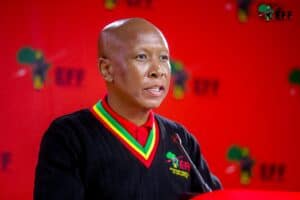The new electricity minister in the Presidency could work, but why not just sack existing underperforming cadres in other ministries?

Despite the extra financial burden to the taxpayer, President Cyril Ramaphosa’s increased centralisation of power in the Presidency has some support, albeit with a pinch of scepticism due to its poor track record.
The new Department of Electricity he announced during his State of the Nation Address (Sona) on Thursday will be the third in the Presidency after the Department of Planning, Monitoring and Evaluation; Women, Youth and Persons with Disabilities and State Security.
Also in the Presidency is the unit headed by former mining executive Sipho Nkosi tasked with cutting bureaucracy and red tape across government, which was announced during his 2022 Sona.
ALSO READ: New electricity minister ‘another crook in the rotten pot’ – DA
The creation of another department in the Presidency has been criticised by political opponents, with the DA charging that the Ramaphosa was abusing the power crisis to create more cushy jobs for useless cadres.
Dr Leon Schreiber, the party’s MP, said they used the Ministerial Handbook to calculate the minimum cost of the new department, assuming Ramaphosa will also “appoint a Deputy Minister of ANC Load shedding as this is his preferred method of spreading around patronage”.
Their estimated cost of more than R27 million annually for the new ministry has, however, been rubbished by ANC secretary-general Fikile Mbalula, who said the ministry won’t have a deputy.
A way to deal with a cabinet he can’t trust, nor fire
Director of Research at Auwal Socio Economic Research Institute (ASRI) Angelo Fick believes centralising these structures in the presidency could be Ramaphosa’s way of working around the limits his party may have placed on him through its structures like the National Executive Committee (NEC).
He said this allows him to appoint people he trusts into his inner circle, rather than having several members in a bloated cabinet that he seemingly cannot remove.
Fick asked how else are we to account for celebrations of matric pass rates whilst grappling with a literacy crisis due to poor quality of basic education, a housing crisis, and multiple crises across public enterprises, sport, arts and culture, and social development.
ALSO READ: Eskom mum on new electricity minister to resolve load shedding
“What ever happened to the performance agreements for ministers, which surely should be made public given the administrative transparency envisioned for post-apartheid South Africa, and more especially after the ‘lost years’ of state capture and executive impunity?” Fick quizzed.
He said this was the direct consequence of rewarding people for party work with government posts despite the rhetoric of professionalising the public service and policy incoherence that has seen ministers publicly speaking against government policy but retained their posts.
Dismal track record
Fick, however, questioned the track record of this parallel cabinet inside the presidency, saying one can’t help but be cynical about this.
He lamented that gender-based violence and inequality of women persisted despite having a special ministry in the Presidency.
ALSO READ: President’s Red Tape Reduction task team’s power limited by red tape
“…one only has to look at the events of July 2021 or the ongoing trouble with electricity grid infrastructure damage to wonder about the efficiency of state intelligence services in dealing with what increasingly feels like domestic terrorism, given the instability which results from deliberate damage to power infrastructure,” he said.
Toeing the party line
Kealeboga Maphunye, Professor of African Politics at the University of South Africa (Unisa), said this brand of centralisation helps to accommodate as many ANC members, supporters, factions, and alliance partners inside the corridors of power.
He said centralisation also benefited Ramaphosa to keep all his ministers in check and to ensure that they toe the party line, which benefits him as the incumbent Head of State.
“In a state of national emergency, such as during the July 2021 national riots, centralisation might assist the government to quickly mount operations against such a crisis, without entering into elaborate consultations with parliament and other bureaucratic structures,” Professor Maphunye explained.
ALSO READ: ActionSA to consider legal action against Ramaphosa’s ‘draconian state’
He said the main disadvantage about centralising power was that it could undermine the constitutionally enshrined spirit of multiparty democracy, wherein the power of the government must be kept in check by a democratically elected opposition.
Balance of power
“In a constitutional democracy such as SA, balance of power between the Executive, Legislature and Judiciary is normally undermined once the efforts by the other arms of government to keep it (the executive) accountable to the citizens are hamstrung by heavy centralisation,” Professor Maphunye said.
He said another major disadvantage of centralisation is that, given the reality that SA is governed by a one-party dominant regime, centralising power in one office or a few ministers threatened to undermine the power of citizens to interrogate decisions such as the declaration of the state of disaster.
“Ostensibly, the aim of this move is to tackle one crisis, electricity. Yet, many South Africans are asking whether different ministries should be created for crime, GBV (gender-based violence), corruption, unemployment poverty, etc. as each of these constitute crises for the country,” Professor Maphunye said.
Sign of failure
He said given the bloated government structure of more than 25 ministers, the creation of yet another ministry in the Presidency to deal with a function that could easily be tackled by the current ministries, is an indirect acknowledgement that the relevant ministries have failed.
Professor Maphunye said the question therefore was why not reshuffle cabinet and remove the non-performing ministries and reduce wasteful expenditure.
“Surely, this could significantly help SA to avoid overburdening the taxpayers with yet another ministry whose function is currently puzzling to many South Africans. Simply put, centralisation is not the answer to all of the country’s myriad crises,” he added.
NOW READ: Electricity minister needs to be ‘very special’, De Ruyter touted as ‘good candidate






